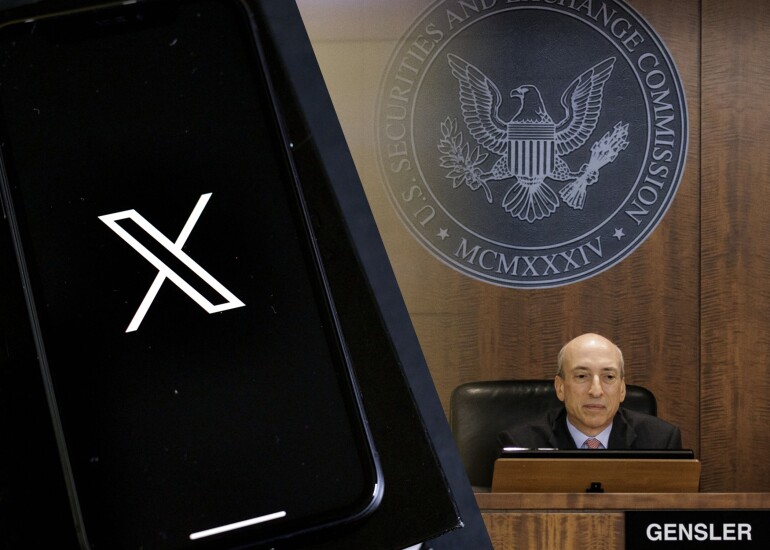In this month's roundup of popular tech news: SEC responds to successful hack on its X account, community banks get closer to fintech hubs, the Office of the Comptroller of the Currency weighs in on Blue Ridge Bancshares and more.

Fintechs contend with banking-as-a-service fallout
"It doesn't matter if you're the problem child," said Jason Henrichs, founder and CEO of community bank consortium
The same could be said of players in the banking-as-a-service space. Financial institutions including

OCC says Blue Ridge in 'troubled condition' over BaaS
The Martinsville, Virginia, bank has been deemed to be in "troubled condition" by the Office of the Comptroller of the Currency, which entered the consent order on Jan. 24. Billy Beale, CEO of the $3.3 billion-asset bank, said in a written statement to American Banker that the consent order is based on the OCC's findings from a June exam, and is "not
The regulatory action marks another

FDIC action against Tennessee bank emphasizes tech
The FDIC demanded the community bank, which is based 30 miles north of Memphis, Tennessee, take a broad set of actions to remedy its violations of the Bank Secrecy Act [BSA], according to a consent order that was made public on Dec. 29. The order, which took effect Nov. 30, requires Brighton Bank to appoint a BSA officer, enhance audits of information technology, and train staff in BSA/AML requirements, among other action items.
The consent order emphasizes the need for stronger information technology controls for the bank's compliance and cybersecurity. Brighton Bank did not respond to requests for comment.

'We are picky': Inside Amex's fintech strategy
That has included building new platforms that make it easier for fintechs to connect with
The time is ripe to entice new partners, especially for co-branding relationships, as analysts say American Express has successfully heightened its appeal to younger generations. Historically, the stereotype for Amex cards is that they are not widely accepted and they cater to the ultrawealthy, but that has not been true for several years, said Michael Miller, equity analyst at Morningstar.

Community banks are deepening ties to fintech hubs
The ingredients of a thriving fintech hub — essentially, a
"You always need some marketing to help your efforts," said Ryan Christiansen, executive director of the Stena Center for Financial Technology at the University of Utah. "That said, if the programs or focus or leadership aren't sufficient to support the promise of the marketing message, then all the participants will lose confidence in the message."

'They'll stamp AI on everything': Ludwig on vetting fintechs
"We already know where the direction of the world is going — it's going to be more tech, more tech, more tech," said Ludwig, who was Comptroller of the Currency under President Bill Clinton. "So at this point, there's no excuse for the bank regulators not to have top people in their organizations that are well versed in tech. And they've got to get them from the private sector."
Further, banking agencies ought to be paying up for senior talent, he said. "They've got to get people who come from industry who are knowledgeable and top notch and they've got to pay for it," he said.

To reduce bank account closures, AI needs data — and humans
The Consumer Financial Protection Bureau received 2,941 complaints about bank savings and checking account closures in 2023, about a 50% increase from 2022 and nearly double what it was in 2020. In addition, journalists at
Insiders chalk the increases up to a combination of aggressive AML rules, the automation of AML and the quest for efficiency and cost-cutting which leads to quicker investigations of suspicious transactions, if they are investigated at all. But a combination of advanced AI, richer customer data and more human involvement could help reduce the volume of closed accounts.

The tech Upgrade plans to use to keep AI-based lending fair
A case in point is Upgrade, a San Francisco-based challenger bank that provides mobile banking, personal loans, a hybrid debit and credit card, a credit builder card, auto loans and home improvement loans to five million consumers. Upgrade is partnering with an "embedded fairness" provider called
"What [the partnership with FairPlay] is accomplishing for us is making sure we are fair and compliant and making appropriate credit decisions that don't have a disparate impact on any protected category," said Renaud Laplanche, founder and CEO of Upgrade, in an interview. Over time, Upgrade plans to apply FairPlay to all its credit products.

Hacker hijacked phone number to post fake SEC tweet
In a post on X after the SEC regained control of the account, the commission acknowledged its X account had been compromised and that it had not approved spot bitcoin exchange-traded products.
An official X account said the compromise was not due to any breach of the social media platform's own systems. Rather, through a third party, "an unidentified individual" gained control over a phone number associated with the SEC's official government account.

Ripple effects of New York Times' suit of OpenAI, Microsoft
At a minimum, companies that use generative AI will need to be more mindful of copyright law. They will need to watch the articles, research and data used to train the large language models they use, even if the training is done by a third party, and know whether any of that content is protected by copyright law and therefore off limits. This is especially true for banks that plan to open up a large language model to customers in the form of a chatbot, the way OpenAI has done with ChatGPT.
U.S. copyright law gives the owner of a copyright — the creator of a piece of content or that creator's employer — the right to control the copying of that work and control the modification or adaptation of the work into new works.





